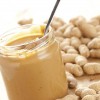 Peanut butter is a staple in the diets of many children, but it can cause serious problems for those with a peanut allergy. Knowing how to identify foods that contain peanuts, what to pack for school lunches, and how to reduce accidental contact with peanuts will help keep children with peanut allergies safe when they are away from home. This 5-page fact sheet was written by Sarah Schmidt, Karla Shelnutt, and Gail Kauwell, and published by the UF Department of Family Youth and Community Sciences, February 2013.
Peanut butter is a staple in the diets of many children, but it can cause serious problems for those with a peanut allergy. Knowing how to identify foods that contain peanuts, what to pack for school lunches, and how to reduce accidental contact with peanuts will help keep children with peanut allergies safe when they are away from home. This 5-page fact sheet was written by Sarah Schmidt, Karla Shelnutt, and Gail Kauwell, and published by the UF Department of Family Youth and Community Sciences, February 2013.
http://edis.ifas.ufl.edu/fy1345
Tag: Gail P. A. Kauwell
Hydration in Hot Working Environments (FCS80018/FY1325)
 Are you at risk for heat-related illnesses? Summertime isn’t the only time you should be concerned about drinking enough water to stay hydrated. Workers in construction, landscaping, laundry, factory, farm, or restaurant settings, among others, often are faced with hot working environments year-round. These conditions can increase the risk for developing heat-related illnesses, so staying well hydrated is very important. This 3-page fact sheet was written by Jeanine Beatty and Gail P. A. Kauwell, and published by the UF Department of Family Youth and Community Sciences, March 2012.
Are you at risk for heat-related illnesses? Summertime isn’t the only time you should be concerned about drinking enough water to stay hydrated. Workers in construction, landscaping, laundry, factory, farm, or restaurant settings, among others, often are faced with hot working environments year-round. These conditions can increase the risk for developing heat-related illnesses, so staying well hydrated is very important. This 3-page fact sheet was written by Jeanine Beatty and Gail P. A. Kauwell, and published by the UF Department of Family Youth and Community Sciences, March 2012.
http://edis.ifas.ufl.edu/fy1325
Raising Healthy Children: Food Allergies (FCS8997/FY1282)
If your child with a newly diagnosed food allergy, you may feel scared, confused, and anxious. You are not alone. According to the Centers for Disease Control and Prevention, over three million children under the age of 18 have food allergies, and this number is growing rapidly. Food allergies can be caused by many different foods. The symptoms range from a mild skin rash to serious breathing problems. This 4-page fact sheet highlights the causes and symptoms of an allergic reaction, as well as the steps to take if your child has been diagnosed with a food allergy. Also included are recipes and possible changes to your family’s diet that can help make meal time easier. Written by Lauren Headrick, Karla P. Shelnutt, and Gail P. A. Kauwell, and published by the UF Department of Family Youth and Community Sciences, March 2012.
http://edis.ifas.ufl.edu/fy1282
The Benefits of Breastfeeding (FCS8994/FY1269)
Experts agree that breast milk is the best food for babies for the first six months of life. It is a healthy choice that offers many benefits for both mother and baby. Breast milk is an excellent source of nutrients and antibodies, and breastfeeding helps to create a strong bond between mother and child. For the mother, it may help to lose weight gained during pregnancy and reduce the chances of developing common diseases like diabetes and breast and ovarian cancer. Breastfeeding is also economical, convenient, and natural. This 5-page fact sheet informs new mothers about why breastfeeding is a great choice. Written by Cassie C. Rowe, Karla P. Shelnutt, and Gail P. A. Kauwell, and published by the UF Department of Family Youth and Community Sciences, March 2012.
http://edis.ifas.ufl.edu/fy1269
Feeding Your Preschooler: Helping in the Kitchen (FCS8992/FY1259)
Encouraging your child to help in the kitchen is a great way to get them more interested in the food they eat and in trying new foods. Helping out in the kitchen also allows your preschooler to learn lifelong skills. This 2-page fact sheet suggests ways to get your preschooler helping in the kitchen as well as the benefits of working side-by-side to prepare family meals and snacks. Written by Ashley R. Kendall, Karla P. Shelnutt, and Gail P. A. Kauwell, and published by the UF Department of Family Youth and Community Sciences, March 2012.
http://edis.ifas.ufl.edu/fy1259
Autism Spectrum Disorder and Diet (FCS8991/FY1258)
There are thousands of Internet sites about ASD and diet, but much of the information has no scientific proof. If you are considering making changes to your child’s diet, the information in this 4-page fact sheet will help you to understand the potential risks and benefits of these changes. Written by Michelle A. Zitt, Karla P. Shelnutt, and Gail P. A. Kauwell, and published by the UF Department of Family Youth and Community Sciences, March 2012.
http://edis.ifas.ufl.edu/fy1258